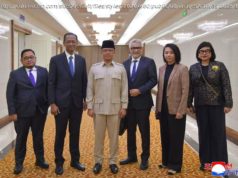Head held high?
Americans might find this surprising, since so much of our media swooned over Kim Yo Jong and North Korea’s cheerleading squad during these Olympics. Now that the respective US and North Korean government delegations have left Pyeongchang, CBS reports that South Koreans took a much more nuanced approach to Pyongyang’s charm offensive. In fact, even among younger South Koreans, it would take more than an attractive chief propagandist and some cheerleaders to warm them up to a neighbor that constantly threatens them with nuclear annihilation:
Some are calling the Winter Olympics the “Peace Games” for presenting an image of warmer ties between North and South Korea, as athletes from both countries marched under a unified flag in the opening ceremony. The sister of North Korean dictator Kim Jong Un also became the first member of her family to visit the South since the Korean War in the early 1950s. But many South Koreans are protesting what they call an “illusion of peace” to appease the North.…
Recent polls show around half of young South Koreans don’t support reunification. Many of them say after 70 years of division, the North is now a foreign country.
“When they wanted to talk, they shot missiles first,” Ha Kyoung Sohn said.
The two teams might have marched under a unification flag, but that’s not a prospect that warms many South Korean hearts either:
One group said reunification might be nice one day but feared it would mean bankrolling the poverty-stricken North and higher taxes for them.
“It’s gonna cost us tons and tons of money to rebuild the country,” Jihee Won said.
The example of Germany may loom large in South Korean minds, and it should. When Germany reunified after 45 years of partition, the eastern part of the country was impoverished, environmentally damaged, and benighted from decades of Soviet domination. Economic issues and differences between west and east still remain, although they have been improving steadily over the last 28 years or so since the fall of the Berlin Wall.
Not only has North Korea been run by a Stalinist state for a generation longer — over 70 years — it’s even more oppressive than East Germany. The population is starving, imprisoned, sick, and uneducated outside of the approved circles. Modern communications and utilities outside the cities are nearly non-existent. It would take decades of infrastructure investment just to fix those problems before the North could begin to pull its weight in productivity.
And none of that will be possible at all as long as the Kim regime remains in place. One would barely know it from all of the gushing coverage of Yo Jong this past week, but she and her family are directly responsible for all of this brutal oppression, and Yo Jong serves her brother Jong-un in perpetuating the family’s grip on power. South Koreans know that better than most. While some may want more cooperation between the two governments (as well as an end to the nuclear threat), very few of them would choose reunification under the Kim family’s terms, no matter how attractive the international media finds Yo Jong and her cheerleading squad.
With that reality in mind, here’s the Reuters headline on Yo Jong’s departure last night: “Head held high, Kim’s sister returns to North Korea.” Head held high? Here’s the explanation from the article itself:
A prim, young woman with a high forehead and hair half swept back quietly gazes at the throngs of people pushing for a glimpse of her, a faint smile on her lips and eyelids low as four bodyguards jostle around her.
In her first appearance on the global stage, Kim Yo Jong, the sister of North Korean leader Kim Jong Un, had her every move closely scrutinised.
Crowds applauded as she stood for the South Korean anthem during the opening ceremony for the start of the Winter Olympic Games, while her big smiles and relaxed manner left a largely positive impression on the South Korean public.
But her sometimes aloof expression and high-tilted chin also spoke of someone who sees herself “of royalty” and “above anyone else”, leadership experts and some critics said.
It took “leadership experts” and “ some critics” to reach that conclusion, eh? The fact that she’s a dynast running a prison-camp state didn’t provide the first clue as to her arrogance, apparently. Reuters needed a body-language expert to deduce that the Kims may just think themselves superior to everyone else. Reuters does get around to talking about the Kim regime’s atrocities, but only in the 19th paragraph — after extolling Yo Jong’s poise and deployment of “soft power.” I’d bet North Koreans don’t think of it as soft at all. Too bad we can’t ask them.






